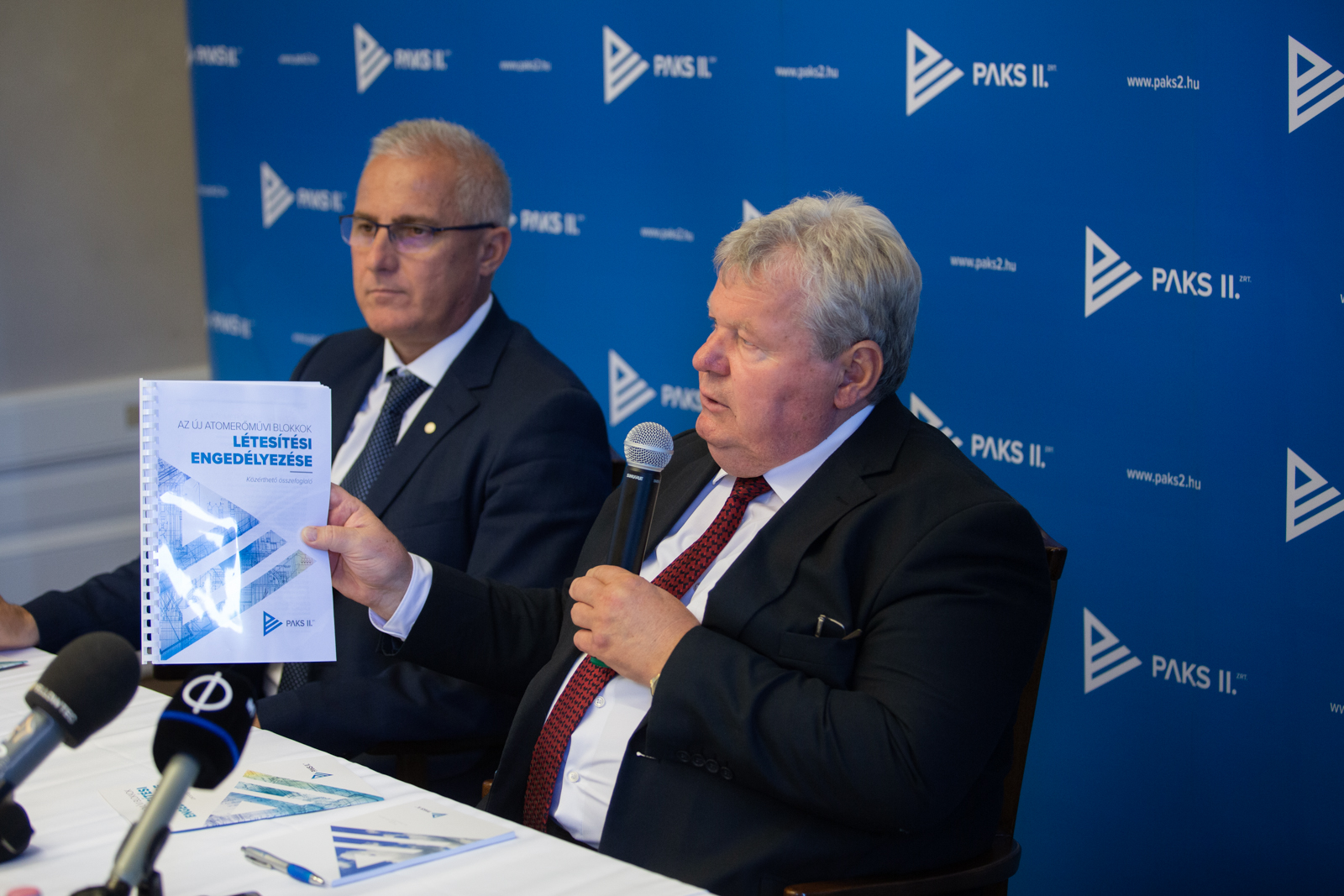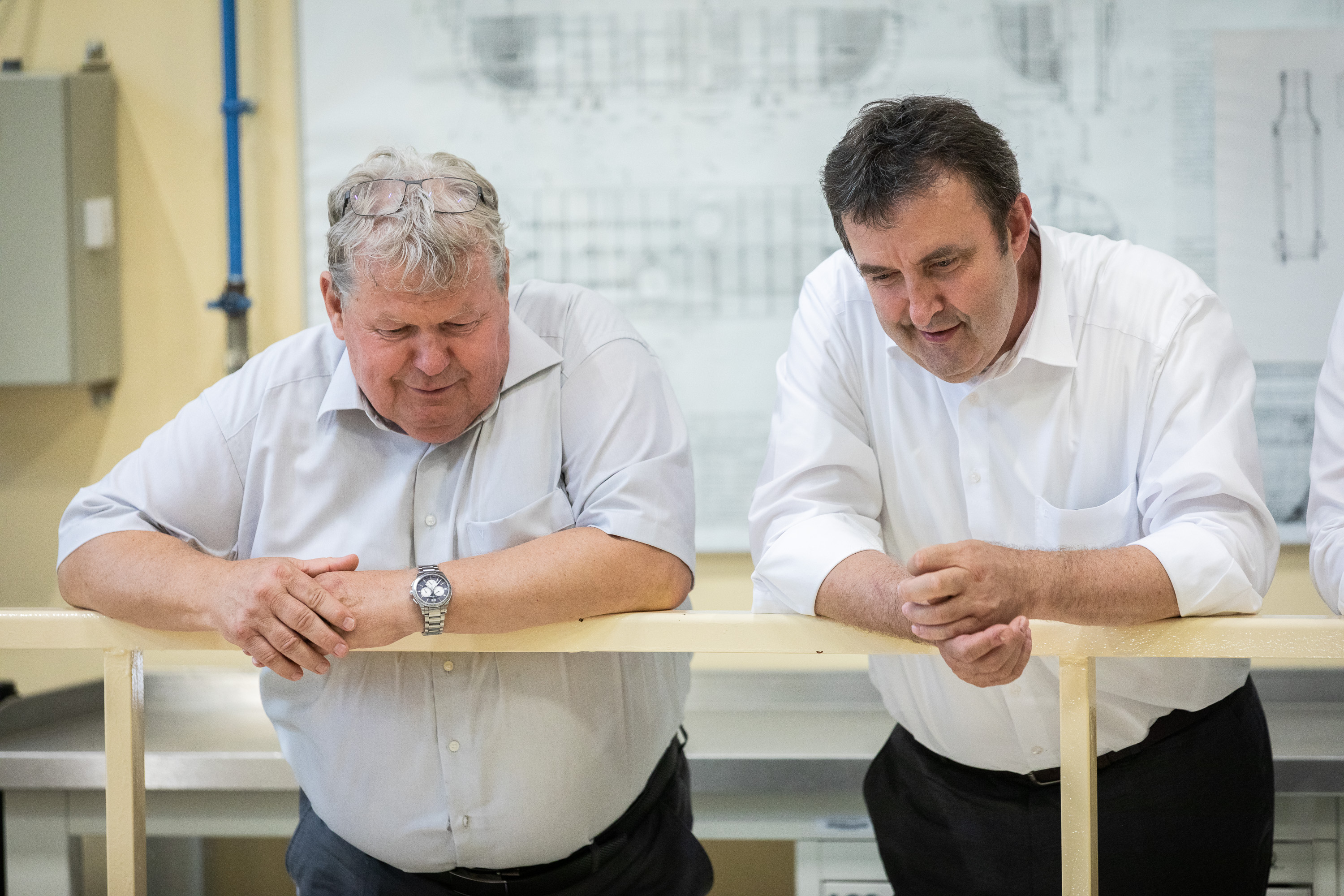Inside the conflicts surrounding the construction of Hungary’s new nuclear plant

An unusual conversation took place a few years ago at the headquarters of the authority that plays a key role in the Paks nuclear power plant expansion. Gyula Fichtinger, the director of the Hungarian Atomic Energy Authority, has always kept a low profile and tried to focus strictly on professional matters. This time, however, he opened up about the potential political conflicts awaiting the agency.
According to one of the participants of the discussion, the conversation happened about three years ago, when the Russian state company, which was hired without an open tender to build Hungary’s new nuclear plant, got stuck with designing the nuclear power plant plans in compliance with Hungarian standards. Fichtinger said that once documents started pouring in from the Russians, it would be difficult to process the huge amount of materials on time. He assessed that the Atomic Energy Authority could find itself under pressure if the Hungarian government thought the office was overly focused on details. “It’s not certain I would retire from this position,” the director said at one point in the conversation, referring to the possibility of him being removed from his office at a later stage.
In the end, Fichtinger was not fired, but recent circumstances from this spring resulted in his resignation. This was revealed in a decree signed by Prime Minister Viktor Orbán on April 28. His resignation came at a time when the authority was involved in the most important task in its 30-year long history: in the past months it has been reviewing the permit request which could open the way for the construction of the two new Paks blocks. This would be the biggest Hungarian investment in the past decades.
The permit, which also contains the Russian plans for the new nuclear power plant, was submitted to the Atomic Energy Authority last summer by Paks II. Ltd., the Hungarian state-owned company in charge of the project. However, according to Direkt36’s reporting, the authority considers the document of bad quality and pointed out several serious problems. One of the concerns relates to the new block being built on an area where earlier geological research showed active fracture lines. In addition, they have found that the submitted material is not thorough enough and according to the authority its certain statements are not substantially documented.
The deadline for the authority to review the permit request is end of September and according to sources with knowledge about the project the process has already generated serious conflicts between the Atomic Energy Authority and the Paks II. Ltd, the company under the supervision of minister János Süli that submitted the application.
At the same time, the government has started drafting a legislative proposal at the end of last year which would restructure the Atomic Energy Authority. One of the most important elements of the draft legislation is that the office would be led for nine years by a person appointed by the Prime Minister. Since Fichtinger felt this new position was not designed for him to fill, he submitted his resignation. Simultaneously, he accepted an advisory role at the Minister of Innovation and Technology led by László Palkovics.
We sent several questions to the Hungarian Atomic Energy Authority, the Ministry of Innovation and Technology, and the ministry of János Süli but received no replies. Fichtinger also declined to comment.
The problematic construction permit
Last June, János Süli, the Hungarian minister in charge of Paks expansion, announced that the most important document related to the new Paks blocks – the construction permit – was submitted to the Atomic Energy Authority. The purpose of the 283-thousand-pages long material is to document that the nuclear power plant can be built and safely operated. The document was prepared by the Russian Rosatom and fine-tuned by the Hungarian state-owned Paks II. Ltd. company.

János Süli, the Hungarian minister in charge of Paks expansion, Source: Paks II. Ltd.
However, according to Direkt36’s reporting, the approving authority was not fully satisfied with the document. The authority made this clear at a public hearing in March when it said that that they had requested additional information from Paks II Ltd. “The application could be of better quality. Therefore, the Atomic Energy Authority formulated concerns,” one source with knowledge about the authority’s internal issues. The source also added that one of the concerns relates to whether the area is earthquake-proof.
Questions around earthquake security emerged after Hungarian investigative outlet Átlátszó in 2017 obtained a geological study on the Paks project. According to this research, the area where one of the blocks was planned to be built showed traces of an earthquake causing fractures on the surface.
The construction of a nuclear power plant on a tectonically active fracture line is banned by a government decree. Nevertheless, the government rejected this concern, claiming that there are other applicable laws in addition to the decree which state that the fracture line becomes an issue only if it can trigger an earthquake that could endanger the future nuclear power plant. According to the government, geological examinations concluded no such risks and the construction could start.
However, according to a source with knowledge about the project, the experts of the Atomic Energy Authority continue to have concerns regarding Russian plans to build one of the blocks precisely above the active fracture line. The authority has already issued a site permit where the blocks could be placed, but not necessarily on the spot envisioned in the plans. But since it is not the task of the Atomic Energy Authority to come up with alternative solutions, this problem must be addressed by the company Paks II. Ltd.
According to sources with knowledge about the Atomic Energy Authority’s internal issues, the office was also concerned by some of the documentation statements not being sufficiently supported by evidence. This problem stems from differences between the Russian and Hungarian standards, with Hungarian standards prescribing stricter documentation requirements. One expert who takes part in the preliminary review of Russian materials described as a typical problem the situation in which Russian engineers reference an assessment when evidencing a statement, but fail to share the assessment itself. “Trust us, it will work,” is a typical answer provided by the Russians according to the source.
Sources also point out that data in the documentation for the permit often do not correspond. A source compared this to a situation if a car factory’s different construction units were calculating with different sized wheels when designing a car. It is important for the data to match, the source said.
These concerns caused tense debates between representatives of the Atomic Energy Authority and the company Paks II Ltd. over the past one year. “These are never easy discussions,“ one source said about how the representatives of the state company reacted to the objections raised by the authority. Conflicts between the two organizations are not a novelty. Earlier, Fichtinger himself told Direkt36 that a legislative change caused “long, tense debates” with the state company.
Planned reorganization of the Atomic Energy Authority
The review of the permit request has been pending since last summer. The Atomic Energy Authority has 15 months to conclude it and the deadline will expire at the end of September. In the midst of the review process burdened by conflicts, the government decided it was time to restructure the Atomic Energy Authority, while also addressing the complaints raised by the office for a long time.
Fichtinger has been for years talking about the insufficient number of staff due to uncompetitive salaries and losing unfilled positions based on a legislative rule. In addition to salary problems, the 2018 assessment report by the International Atomic Energy Agency also pointed out that the Hungarian authority was unable to make even small decisions such as procurement of furniture or mobile phones without the approval of the Ministry of Innovation and Technology.

Janos Süli and László Palkovics, Source: Paks II. Ltd.
At the end of last year, the government started drafting a new concept which would remove the Atomic Energy Authority from the supervision of the ministry and would place it under the parliament’s purview. The government claims this move will increase the authority’s independence, while other problems related to human and financial resources would also be solved by giving the authority the freedom to charge various fees and to spend its income as it sees appropriate, including the number of staff.
But the new concept includes also an unrelated element. Currently, its director is appointed for an indefinite period of time, but according to the draft, the authority would be led by a president appointed by Prime Minister Viktor Orbán without a tender for a period of nine years. The position of the president would be cemented in a way that the removal would not be possible even in case of a potential government change.
The draft remained confidential until mid-May, but the Atomic Energy Authority became aware of the planned concept. According to an acquaintance, Fichtinger felt that the new position was not designed for him and had been considering his resignation since February. “A reorganization of this scale should not be entrusted to a 63-year old person close to retirement, but someone able to be there for the next nine years,” the source explained Fichtinger’s reasoning.
Then, at the end of April, Fichtinger submitted his resignation, two weeks before the draft legislation was submitted to parliament. Simultaneously, he was offered a nuclear energy advisory position in the Ministry of Innovation and Technology led by László Palkovics, a role which he accepted. According to his acquaintances, the former director has become more relaxed as “there are far fewer conflicts in his life.”
Fichtinger’s resignation was surprising not only for outsiders, it also caught the attention of the European Commission. According to a source with knowledge about the issue, the Commission contacted the Hungarian government at the end of May, inquiring about whether the independence of the authority would still be guaranteed in the future. In its response, the Hungarian government tried to reassure the Commission, which requested to keep them informed about further developments.
Parliament has yet to vote on the draft legislation reorganizing the Atomic Energy Authority. At the same time, speculations have started on potential prime ministerial appointees for the role of the president. According to a source, the frontrunner is Andrea Beatrix Kádár, deputy state secretary at the Ministry of Innovation and Technology since 2014. Between 2012 and 2014, Kádár headed the National Security Office coordinating intelligence reports under the Prime Minister’s Office.
Cover picture: Szarvas/Telex


